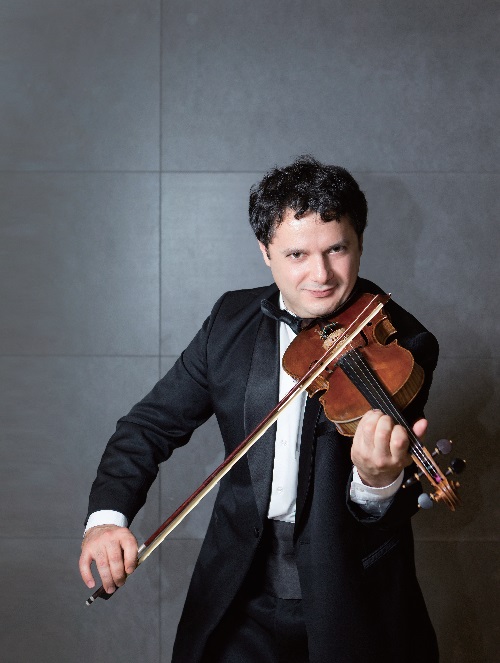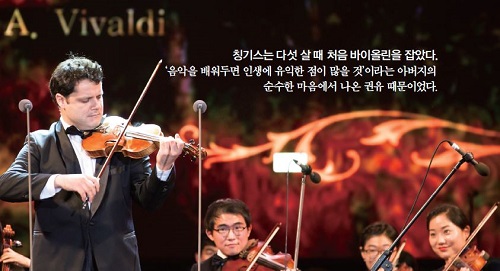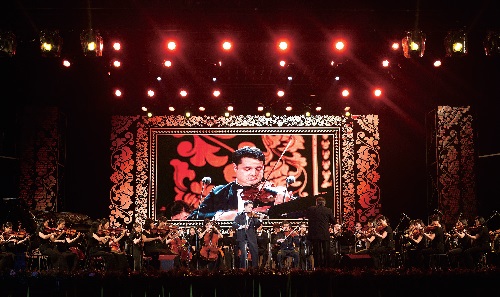매년 7,8월은 유럽인들에게 휴가시즌이다. 근로자든 자영업자든 공무원이든 너도나도 일손을 놓고 먼 곳으로 떠나 몸과 마음을 재충전한다. 그런데 칭기스 오스마노프는 매년 여름휴가 때면 한국을 찾는다.
그리고 평소보다 더 빡빡한 공연스케줄을 치러낸다. 모처럼 찾아온 여유를 즐길 법도 하건만, 왜 그는 항상 바이올린을 손에서 놓지 않는 걸까?

해마다 7월 첫 일요일, 부산 해운대 해수욕장은 세계 각국에서 온 수천 명의 젊은이들과 청소년부 장·차관, 대학 총장들로 한바탕 문전성시를 이룬다. IYF에서 주최하는 청소년캠프인 ‘월드문화캠프’ 개막식이 이곳에서 열리기 때문이다. 7월 3일 열린 올해 월드캠프 개막식 역시 27개국 장·차관들과 23개국 대학 총장들, 44개국 대학생들 등 총 3,200여 명이 참석했다. 여기에 5만여 명의 부산 시민들까지 관객으로 가세하며 백사장은 그야말로 대성황을 이루었다.
하늘이 화답한 음악, 수만 관객이 화답한 몸짓
그라시아스 오케스트라와 함께 개막 축하공연을 위해 무대에 오른 바이올리니스트 칭기스 오스마노프. 그가 처음 선보인 곡은 비발디의 <사계> 중 ‘여름 1~3악장’. 뜨겁게 내리쬐는 햇볕으로 사람도 짐승도 축 늘어져 있던 벌판에 갑자기 천둥과 번개가 몰아치고 우박이 쏟아지는 광경을 묘사한 작품이다. 칭기스와 오케스트라의 협주가 한창 절정을 향해 달려 갈 때쯤 웃지 못 할 사태(?)가 벌어졌다. 그의 음악에 화답이라도 한 듯 하늘이 머금고 있던 잔비를 흩뿌리기 시작한 것이다.
악기, 특히 나무로 된 현악기에 습기가 치명적이라는 사실은 누구나 아는 상식이다. 그럼에도 칭기스와 단원들은 일말의 동요도 없이 연주에만 온 신경을 집중했다. 연주가 끝나고 그는 머리에 묻은 물기를 털어내는 제스처를 하며 살짝 미소를 지어 보였다. 그 몸짓이 마치 ‘여러분을 행복하게 해드릴 수 있다면, 이 정도 비는 아무것도 아닙니다’라는 보디랭귀지처럼 보였다. 수만 명의 관객들 역시 그 뜻을 알아차린 듯 뜨거운 환호와 박수갈채를 보냈다.
흔히 음악을 ‘만국 공통의 언어’라고들 한다. 그 말대로라면 악기는 음악가에게 있어 자신의 마음이나 정신을 표현하고 전달하는 입인 셈이다. 그래서일까, 실제로 음악가들은 악기를 자기 몸의 일부처럼 여긴다. 유럽의 어느 바이올리니스트는 빗길에 미끄러져 넘어지면서도 바이올린만은 지켜야겠다는 생각에 팔을 번쩍 들며 만세를 불렀다고 한다. 첼리스트 정명화는 해외공연을 다닐 때면 반드시 표를 두 장 구입한다. 하나는 남편, 하나는 본인, 하나는 첼로가 앉을 자리다. 그 중 좌석 하나가 떨어져 있으면? 남편을 그 자리로 보내고 첼로를 곁에 둔다.
악기에 대한 음악가들의 애착은 이토록 각별하다. 칭기스와의 인터뷰를 준비하면서 가장 먼저 걱정이 됐던 것도 그의 바이올린이었다. 더구나 그 바이올린은 스승인 미하일 간트바르크 교수가 물려준 것 아닌가. ‘바이올린은 과연 무사할까? 어쩌면 그 때 그 <사계>가 그 바이올린의 마지막 연주는 아니었을까.’
“하하하, 다행히 바이올린은 무사합니다. 바이올린은 실내뿐 아니라 야외에서 연주할 상황까지 감안해서 제작하니까요. 걱정해 주셔서 감사합니다.”
그의 환한 미소와 밝은 목소리를 대하니 마음이 놓였다. 두 시간 넘게 진행된 인터뷰 동안 그는 자신의 음악인생과 악기로서 바이올린의 매력, 음악관音樂觀 등을 열정적으로 쏟아놓았다.


한 손에는 책, 한 손에는 바이올린
칭기스는 다섯 살 때 처음 바이올린을 잡았다. 비교적 어린나이에 시작한 셈이지만, 그렇다고 우리가 음악시간에 배운 바흐나 모차르트처럼 음악가 집안 출신은 아니었다. 그의 아버지는 연구원, 어머니는 엔지니어였다. 아버지는 다만 ‘아들이 음악을 배워두면 인생에 유익한 점이 많을 것’이라는 순수한 마음에서 음악공부를 권한 것이었다고 한다.
-하고 많은 악기 중에 바이올린을 택한 특별한 이유가 있습니까?
“아버지는 제게 무슨 악기를 가르치면 좋을지 깊이 생각하셨습니다. 세계적으로 성악가는 많지만 뛰어난 성악가는 몇 안됩니다. 피아니스트도 많지만 정말 훌륭한 피아니스트는 소수에 불과합니다. 아버지는 ‘얘가 음악가가 되더라도 솔리스트가 될 만큼 대성할 재능이 없으면 어떡하지?’ 하는 것까지 생각하셨습니다. 음악가도 사람인 이상 솔리스트가 되기 힘들다면 악단에라도 들어가 일을 해야 생활을 할 수 있잖아요?
관현악단, 즉 오케스트라의 관악기 연주자는 다 합해야 15명 정도입니다. 반면 바이올린 연주자는 25~30명에 이릅니다.
바이올린은 악단에 자리를 얻기가 상대적으로 쉽겠다는 생각에 바이올린을 배우라고 하신 것이었습니다. 그렇게 시작한 음악이 재미있었고 전혀 어렵다는 생각이 들지 않았습니다.”
-열다섯 살에 상트페테르부르크 국립음악원에 입학하셨는데요.
“네, 그때가 바로 제 음악에 변화가 일어난 시기입니다. 음악원에 입학하고 얼마 후 문득 ‘바이올린을 이렇게 대충 연습하면 안 되겠다’는 생각이 들었어요. 그래서 연습량을 늘려 갔습니다. 밤 10시가 되면 연습을 더 이상 하면 안 되는 것이 음악원의 규칙입니다. 하지만 하루종일 연습을 했는데도 더 해야겠다는 생각에 차마 소리는 내지 못하고 손가락으로만 연습을 했습니다. 평소보다 연습을 덜한 날은 ‘이러다가 감각이 무뎌지는 건 아닐까?’ 하는 불안감에 휩싸이기도 했지요. 시험기간에는 음악 외에 다른 과목도 공부해야 했습니다. 감각을 잃을까 봐 한 손에는 책을 쥐고, 다른 한 손으로는 연습을 했습니다.”
무대에 섰을 때 가장 자유롭다
1982년생인 그의 나이는 올해 서른넷이다. 내년이면 바이올린을 한 지도 꼭 30년이 된다. 그는 그 긴 세월 동안 하루도 연습을 거르지 않았다고 했다. 다른 사람과 대화를 나눈 시간보다 바이올린 소리를 들은 시간이 더 많을 것이라는 게 그의 말이다. 문득 궁금해진다. 30년 가까이 바이올린을 하면서 지겨웠던 적은 없었을까? 듣기 좋은 꽃노래도 한두 번이라는 속담도 있지 않은가. 아니면 바이올린에는 여느 사람이 알지 못할 독특한 매력이 숨어 있는 건 아닌지.
-바이올린만이 지닌 매력이 있다면 무엇입니까?
“아주 여린 소리부터 큰 소리까지, 낼 수 있는 음역대가 굉장히 넓다는 점이 매력입니다. 바이올린 소리는 자연에서 듣는 새소리나 바람소리와도 비슷합니다. 반면 첼로는 굉장히 낮은 소리를 냅니다. 트럼펫은 소리가 기본적으로 크고 힘이 있어서 여린 소리는 표현하지 못합니다. 플루트는 가냘픈 소리는 내기 쉽지만, 웅장한 소리는 내기 어렵습니다. 또 바이올린은 템포도 자유자재로 조절할 수 있어요. 부드럽고 차분한 연주를 하다가도 금세 빠르고 격정적인 연주로 넘어갈 수 있습니다.
오케스트라에서는 악기마다 역할이 다릅니다. 어떤 악기는 전체 멜로디를 이끌어가는가 하면, 어떤 악기는 리듬을 담당 합니다. 바이올린은 곡의 처음부터 끝까지 쉬지 않고 연주합니다. 표현할 수 있는 폭이 크다 보니 청중에게 제가 어떤 곡을 연주하는지 전달하기에 유리합니다. 그래서인지 바이올린을 연주하려고 처음 무대에 섰을 때 편안한 느낌이 들었어요. 그 느낌이 좋아 지금까지 바이올린을 계속해 올 수 있었습니다.”
-무대에 설 때가 편안하다니, 좀처럼 상상이 가질 않는데요.
“사실이에요. 그때의 제 모습이 바로 있는 그대로의 제 모습입니다. 어느 사회든 거기서 통용되는 예의나 규범이 있습니다. 한국이라면 버스에 탔는데 나이 많은 분이 서 계시면 자리를 양보하는 게 예의잖아요? 하지만 요즘은 내 몸이 어딘가 불편하면 굳이 자리를 양보 하지 않아도 됩니다. 이처럼 그 사회에서 통하는 룰이 있고, 그 룰은 시류를 따라 변합니다. 제 말이나 행동의 결과를 의식하고 예의도 차리다 보면 있는 그대로의 저를 표출할 수 없지요.
하지만 무대에서는 다릅니다. 만약 제가 꽃이나 햇볕을 좋아하는 따스한 성품이라면 사람들은 제 음악을 듣고 그런 제 성품이나 에너지를 그대로 느낄 수 있을 것입니다. 감동을 받거나 어떤 영감을 느낄 수도 있을 테고요.”
국내 6개 도시를 순회하는 클래식 콘서트 ‘스바보드나’, IYF 월드문화캠프, 세계 청소년부 장관 포럼, 세계 대학총장 포럼, 크리스마스 칸타타, 임진각 평화기원 콘서트, 대구 코오롱야외음악당 콘서트, 베냉 전 대통령 보니 야이 초청강연…. 칭기스가 지난 6월 말 한국에 와서 7월 중순까지 무대에 올랐던 행사들이다. 이 공연들 내내 그는 거의 모든 곡을 악보 없이 연주했다.

-임진각 콘서트에서 연주한 ‘멘델스존 협주곡 64번 3악장’은 총길이 7분의 긴 곡입니다. ‘저 곡을 완벽하게 연주하기까지 얼마나 많은 연습을 했을까?’ 하는 생각을 해 봤습니다.
“제 꿈은 유명한 음악가 또는 큰 무대에 서는 것이 아닙니다.제가 머릿속으로 생각하고 마음이 원하는 그대로를 연주하는 것이 가장 큰 목표입니다. 지금도 그 목표에는 변함이 없습니다. 제 마음 속에 있는, 제가 말하고 싶은 그대로를 말로 전달할 수 없다면 얼마나 답답하겠어요.
저도 늘 잘하고 싶지만 제 연주에 만족한 적은 없습니다. 한번은 연주 도중 약간 실수를 했는데 제가 생각했던 것보다 좋은 연주가 나왔습니다. 그렇다고 다음에 그 곡을 연주 할 때 똑같이 실수를 할 수는 없지요. 우연히 된 것이니까요.
연습할 때부터 ‘나는 연주를 못해. 실력이 미숙해’ 하고 생각하면 실전에서도 그렇게 됩니다. 그래서 연습할 때부터 실전처럼 연습합니다. 연습은 혼자서 하지만, 무대는 사람들에게 기쁨을 주려고 연주하는 것이니까 오히려 더 쉽습니다.”
-매년 여름 한국을 찾아 세계의 청소년들과 음악팬들에게 멋진 연주를 들려주고 계십니다. 특별히 한국을 찾는 이유가 있습니까?
“늘 같은 장소에서 같은 일만 하다가 다른 나라에 다녀오면 평소 지나치던 것들이 새롭게 보입니다. 한국에 왔다 가면 오랫동안 마음이 편안해져요. 또 어른을 공경하는 한국 문화도 경험하고, 그라시아스 단원들의 기량이 매년 성장하는 모습도 볼 수 있습니다. 대개 오케스트라 단원들은 저마다 자존심과 개성이 강하다 보니 서로 잘 어울리기가 쉽지 않아요. 그래서 지휘자는 단원들을 단합시키느라 애를 많이 먹습니다.
그라시아스 단원들은 모두 한마음으로 움직입니다. 설령 내일 비가 오더라도 야외에서 음악회를 하기로 하면 모두가 그 결정을 따릅니다. 지휘자는 연주를 잘하는 오케스트라보다 모두가 똑같이 생각하고 행동하는 오케스트라를 원합니다. 저도 그런 오케스트라와 연주할 때 단원들에게 믿음이 가지요.”
바이올리니스트라면 누구나 아름다운 소리를 내는 것으로 유명한 스트라디바리우스나 과르네리 같은 명기名器를 갖기를 꿈꾼다. 하지만 아무리 훌륭한 바이올린도 줄을 끊어지기 직전까지 팽팽하게 당겨주지 않으면 아름다운 소리를 낼 수 없다. 바이올린을 시작한 이래 단 하루도 바이올린을 손에서 놓은 적이 없다는 칭기스 오스마노프. 관객이 많을수록 그는 긴장하기보다 ‘이 많은 사람에게 기쁨을 선사하겠다’는 생각에 들뜬다. 모두가 쉬는 휴가기간에도 오히려 긴장의 끈을 팽팽히 당기는 그는 진정 바이올린을 닮은 음악가였다. 그것이야말로 언제 어디서든 무대에 오를 준비된 음악가의 비결이리라.
칭기스 오스마노프Chingiz Osmanov
러시아 상트페테르부르크 국립음악원을 과 수석으로 졸업하고, 대학원에서는 러시아 인민예술가인 미하일 간트바르크 교수를 사사했다. 야샤 하이페츠 국제 바이올린 콩쿨 등 다수의 대회에서 수상했다. 연주자로서만 아니라 음악감독, 지휘자, 모교의 교수로도 활동 중인 다재다능한 아티스트다.
Always Ready to Rise on Stage: Violinist Chingiz Osmanov
July and August of every year is vacation season for all Europeans. Whether they are laborers, entrepreneurs, or government officials, this is the time of year to put down their work and travel far away to reenergize their bodies and minds. However, Chingiz Osmanov visits Korea every year for his summer vacation. He goes through an even busier performance schedule than usual. He may want to enjoy his long-deserved rest, but why does he choose to not let go of his violin?
Every year on the first Sunday of July, Haeundae Beach in Busan is flooded with Ministers and Deputy Ministers of Youth, university chancellors and thousands of youth from numerous countries from around the globe. It is because the Opening Ceremony of the World Culture Camp hosted by the IYF takes place here. This year’s Opening Ceremony for World Camp had Ministers and Deputy Ministers from 27 countries, chancellors from 23 countries, and university students from 44 countries to a total of approximately 3,200 participants in attendance. Furthermore, 50,000 Busan citizens joined the audience, turning the white sandy beach into a grand gathering.
The Music the Heavens Answered to, and the Motion Tens of Thousands Answered To Violinist Chingiz Osmanov rose on stage. He showcased Summer 1st Movement to 3rd Movement in Vivaldi’s Four Seasons with the Gracias Orchestra. This piece portrays a large sunlit field where both man and beast melt under the sun, when suddenly thunderbolt and lighting strike down followed by hail.
While Chingiz and the orchestra were hastening to the climax, an unfortunate incident had occurred. It was as if the heavens had responded to the music, and it showered light rain it had been holding back. Anyone with basic instrumental knowledge would know that humidity is especially detrimental to wooden string instruments. Nevertheless, Chingiz and the orchestra members continued to perform without the slightest hint of agitation, but focused entirely on the performance. After the performance, he shook off the water from his hair, and put on a small grin. His gesture was as if he was speaking in sign language saying, “If it make you happy, this much rain is nothing.” Tens of thousands of people sent him heated applause and shouts of joy in understanding.
Music is often referred to as “international language of the humanrace.” If that saying were true, instruments would be musicians’ mouths that express their hearts. Perhaps that is the reason why the musicians in reality, consider their instruments as a part of their body. It was said that a certain European violinist slipped on a rainy road but raised up both of his arms to at least protect the violin. Cellist Myung Wha Chung makes it her duty to purchase two plane tickets when she travels for overseas performances: one for her cello and the other for herself.
The strong sense of attachment of the musicians to their instruments are just so. As we prepped for our interview with Chingiz, I was worried about his violin first and foremost. Especially that violin had been given to him by his instructor Mikhail Gantvarg, “Would his violin be safe? Perhaps the Four Seasons was the violin’s last performance.”
“Hahaha, the violin is alright fortunately. They make violins to perform not only indoors but also outdoors. Thank you for your concern.”
His bright smile and light voice relieved my heart. The interview lasted for more than two hours and he passionately shared every detail of his musical career, the charm of the violin as an instrument, and the values of music.
A Book in One Hand, a Violin in the Other
Chingiz held the violin for the first time at five years of age. Though he started at a relatively young age, but he was not from a musical family like Bach or Mozart, whom we all learn about in music class. His father was a researcher and mother was an engineer. However, his father purely felt that, “If my son learns music, it will benefit his life,” so he recommended his son to learn music.
-Is there any special reason why you chose the violin among all other instruments?
“My father thought deeply about what instrument I should learn. There are many vocalists all over the world, but there are not many great vocalists. There are many pianists as well, but only a few are really great pianists. My father even thought, ‘What do we do if my son becomes a musician, but does not have the talent to become a soloist?’ If a musician cannot become a soloist, he should at least be able to enter an orchestra to make a living off of his work, right? All the wind instrument performers in an orchestra are 15 in total. On the other hand, there are usually 25 to 30 violinists. He told me to learn the violin, because he thought that it would be easier to grab a seat in an orchestra. That is how I began learning the violin, which I had fun with, and it was not difficult at all.”
-And you enrolled at the St. Petersburg Conservatory at 15.
“Yes, that was when a change occurred in my music. A short while after enrolling into the conservatory, I began to think, ‘I should notpractice haphazardly like I usually do.’ So I began to practice more.
The conservatory regulation prohibits practice after 10 P.M. However, even though I practiced all day long, I still thought I needed to practice more. So I practiced only with my fingers to keep silent. On days when I practiced less than usual, I would be overcome with concerns like, ‘Am I going to lose my sense of music like this?’ During exam periods, I had to study not only music but other subjects as well, so I held a textbook in one hand, and practiced with the other, because I was afraid I would lose my sense of music.”
On Stage Is Where I Am the Most Free
As he was born in 1982, he is 34 this year. Next year marks his 30th year playing the violin. He said that he never missed even a single day of practice in that long period of time. He says that he has spent more time listening to the violin than talking to people. I suddenly became curious.
I wondered if he ever gets tired of it in the last 30 years. They say that even a sweet melody is good for only once or twice. Or is there a unique charm in violin that ordinary people do not know about?
-If there is a charm unique to violins, what would you say it is?
“The charm would be the wide range of sounds from a delicate to a loud sound. Violin sounds are similar to the sound of birds or winds.
On the other hand, the cello makes a very low sound. Trumpet sounds are strong and loud, so it cannot express delicate sounds. Flute can make feeble sounds, but cannot make grand sounds. In addition, the violin can freely adjust its tempo. While you perform a soft, calming music, you can suddenly pick it up into a fast and passionate performance.
Each instrument has a different role in the orchestra. While some instruments lead the entire melody of a piece, some are in charge of the rhythm. However, the violins perform from the beginning until the end without rest. Because the range of expression is so wide, I get the advantage over what kind of a song I am delivering to the audience.
Maybe that’s why I felt at ease when I stood on the stage to perform on the violin for the first time. I enjoyed the feeling and that is how I was able to continue until now.”
-It is hard to imagine that you feel at ease when you stand on stage.
“It is true. That is when I am myself. Whatever society it may be, there are acceptable manners and customs. For instance, it is a custom in Korea to give up your seat to the elderly on buses, right? However nowadays, if my body is ill, then I do not necessarily have to give up my seat. Likewise, every society has acceptable rules and those rules change very often. I may tell a joke and some may find it funny, while some may misunderstand and even get scarred in their hearts. When I have to be aware of the consequences of my words and actions while paying respect to mannerisms, then I cannot express as myself as I am. However, it is different on the stage. If I am a type of a person who enjoys flowers and sunlight, then people will feel my exact personality or energy when they listen to my music. Sometimes they may feel touched or even become inspired.”
Chingiz rose to stage from the end of June to the middle of July for Svobodno, the classic concert in six major cities of Korea; IYF World Culture Camp; World Youth Ministers Forum; World Education Leaders Forum; the Christmas Cantata; the World Peace Concert at the Imjingak Resort; and the special guest lecture given by the Former President of Benin, Dr. Yayi Boni. What shocks us even more is that he performed most of the pieces without music sheet.
-The piece you performed at the Imjigak Concert, Mendelssohn Concerto No.64 3rd Movement, is a seven-minute piece. I wondered, “How much practice did it take to perfectly perform that piece?”
“I never dreamed of becoming a famous musician or standing on a stage ever since I was a child. My greatest goal was to play what I thought inmy head, and as my heart wanted. After all, music is a language right?
How frustrating it would be, if I could not express what I want to say? I am always eager to do well for my performances. However, I have never been satisfied with my own performance. I once made a small mistake while performing, but it turned out to be a better performance than what I had expected. That being said, I cannot repeat the same mistake again, because it was a coincidence.
If I think to myself during practice, ‘I cannot play well. I am unskilled,’ then the actual performance turns out exactly like that. That is why I practice as if it is the actual performance. Practice is when you perform alone, but on stage, I perform to make people happy, so that is why the performance is easier than practice.”
-You have been visiting Korea every summer and performing great music for the youth and fans of music. Are there any special reasons that bring you to Korea?
“I always do the same thing in the same place, but when I return from visiting different countries, the ordinary things look so new. My heart finds peace for a long time, when I return from my visit to Korea. I get to experience the elderly respect in the Korean culture, and I get to see the members of the Gracias Choir rise in caliber each year. Members of most orchestras are very proud and idiosyncratic, so it is not easy for them to get along with each other. The conductors often have to deal with a lot of trouble to unite their members.
All the members of the Gracias Choir move in one heart. Even if it rains tomorrow, when they decide to have an outdoor concert, then they all honor that decision. Any conductor wants a single orchestra that will think and act together like the Gracias. I also give my trust to the Gracias members, when I perform with them.”
Any violinist dreams of owning a Stradivari or Guarneri, which are famous for their bountiful and beautiful sound. However, they say that no matter how great the violin may be, if the strings are not tightened to the breaking point, it cannot produce a beautiful sound.
Chingiz Osmanov, the violinist who had never put down the violin since his beginning at age five. As his audience grows larger, he doesn’t get nervous. Rather, the thought to, “present happiness to many more people,” excites him. He truly takes after the violin, as he tightens the string of nervous tension even during vacation season. That is the secret of a musician who is ready to go on a stage at anytime, anywhere.
Chingiz Osmanov
As a Valedictorian graduate at the St. Petersburg Music Conservatory, Chingiz studied under Professor Mikhail Gantvarg, the People’s Artist of Russia, during his graduate years. He was awarded numerous prizes from various competitions such as the Jascha Heifetz International Violin Competition. Not only does he perform, but he is also an active music director, conductor, and professor at his alma mater, a truly multi-talented artist.

